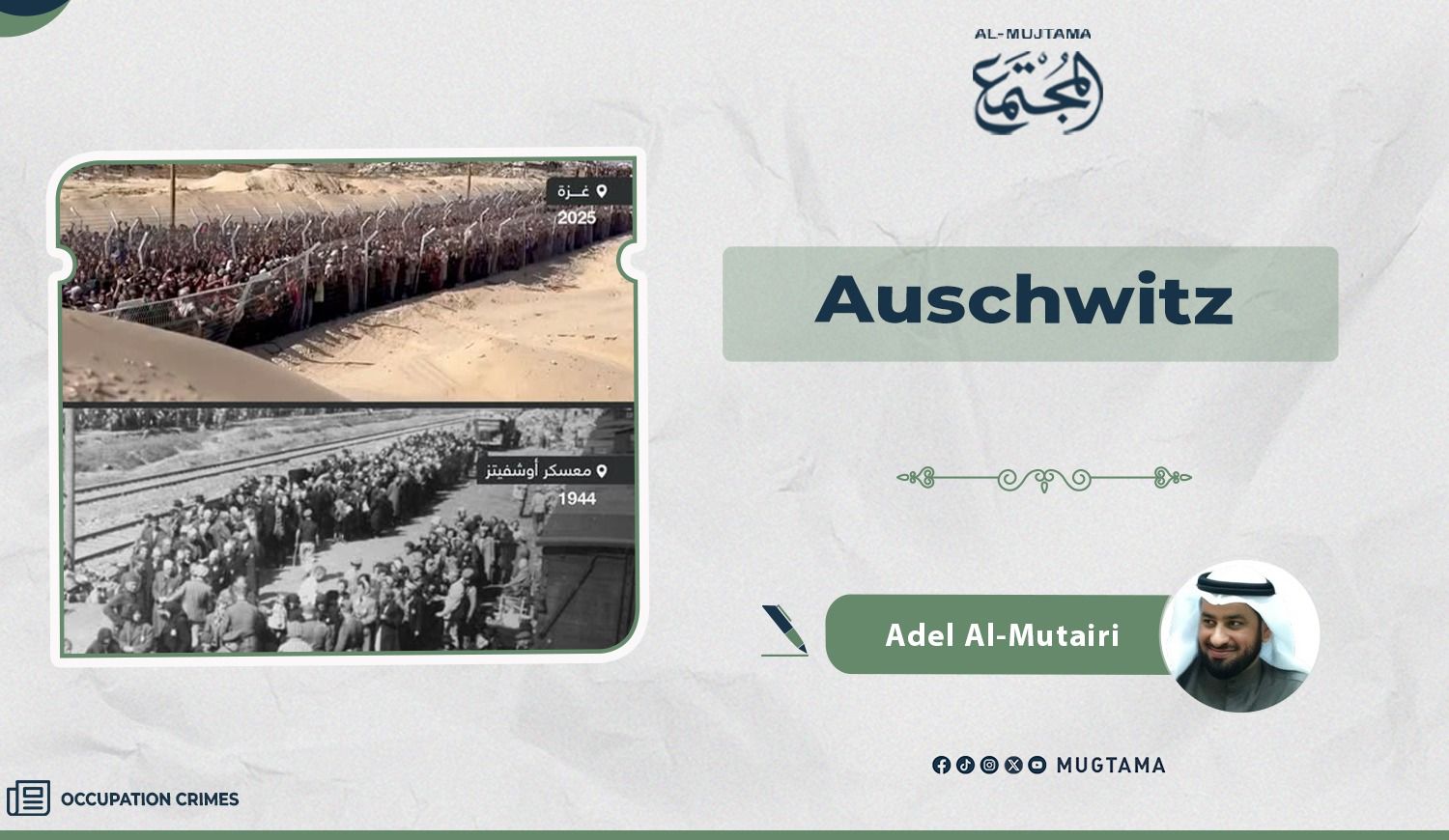From Auschwitz to Gaza: History Repeats Itself

Anne Frank was not merely a
survivor of the Nazi Holocaust crimes in the Auschwitz camps; rather, the
diary she penned stood as a witness to what took place between 1942 and 1944,
documenting the scene before her at that time.
It also opened the door for readers to draw comparisons with the killing,
burning, and starvation of human beings in our world today:
"People were dying in gas chambers, or soldiers would drive them out
into the camp yards to kill them. Those who asked for water or food were forced
to walk a distance and then shot, as the soldiers laughed. Many more died from
hunger and thirst — they were the majority."
Gaza’s Silent Holocaust
In his book If This Is a
Man, Italian chemist Primo Levi recounts a series of Nazi atrocities that
are in no way different from Zionist brutality:
"There were
scenes of men, naked and crammed into a small space, as a soldier opened the
door to the room, letting the freezing wind attack them mercilessly. I remember
those who died of hunger while naked, and those who drank from that tap which
bore a warning not to drink the water."
Nazi Auschwitz is no
different in form or substance from Zionist Auschwitz in Gaza, which imposes a
deadly siege and uses its killing machine against those racing to survive and
searching for food and water.
Today, Zionism renews the
same Nakba, the same siege, and the same killing against defenseless
Palestinians—starting from the entry of the Indian Battalion into Jerusalem,
its siege of Al-Aqsa Mosque, and its killing of Muslims inside after days of
blockade; to the Battle of Al-Qastal, marked by clear Arab inaction as the
mujahideen waited for the Arab army to enter Jerusalem… but it never came.
Gaza Is the New Nakba
Then came the devastating
Nakba of 1948, followed by decades of displacement and oppression that have
shadowed the Palestinians for the past eighty years—through the crises of wars,
the ongoing cycle of killing and blockade, and finally, Gaza and the events
that have followed.
Primo Levi writes in his
memoirs:
"They
gathered the men in one room—there were 96 of them—and the women in another—29
in total—while the children stood outside watching as the Nazi officer blew up
the rooms with everyone inside."
Does this not resemble what
the Zionists are doing today—demolishing, killing, and oppressing?
"Fragmentation of the Western model"
For decades, Western
civilization took pride in its model, built on the ideas of Martin Luther
regarding freedom and equality, Rousseau on rights and justice, and David
Hume’s frameworks for state-building, politics, democracy, and the protection of
human beings and their rights—alongside others.
This model came to exert wide
influence over Arab and Muslim intellectual elites.
However, this model and the
civilization it produced have suffered fragmentation, collapsing into a deep
chasm between what it proclaims and what it witnesses yet turns a blind eye to,
and between what it defends with notorious selectivity and well-known double
standards.
The West’s Hypocrisy Unveiled
I don’t know why I was
reminded of the words of the Portuguese writer and novelist:
In
this profound question, he reveals the strange paradox between what the Western
model proclaims and what Western civilization has achieved, and what is
happening today.
It races toward the skies and pierces through distances yet remains incapable
of piercing through the contradictions within its own model, or of mending the
human rift and safeguarding the moral framework of humanity.
The
Western model stumbles over the very values it once championed, cloaking itself
in the same darkness it once fought against.
It calls for justice and equality, yet it entered with falsehood and departs
with it.
The Civilization That Forgot Itself
"Western civilization is incapable of confronting itself or facing
the truth.
Its spokespeople never cease chattering about human rights, women’s rights,
children’s rights, and even the rights of cats and dogs… etc."
By its own unjust standards, Western civilization is the same one that
witnessed and lived through the extermination of the Indigenous peoples in North
America, and that continued—into our modern era—in Vietnam, Bosnia and
Herzegovina, and Chechnya.
In
this book, may Allah have mercy on him, Al-Messiri elaborated on the
relationship between Zionism and Nazism, and the similarities in narrative and
ideological reference between Zionism and fascism.
And
if you wonder, then wonder at the Zionists’ and Jews’ adherence to their
ideological references—their constant appeal to what is found in Herzl’s book The
State, “the Zionist Gospel,” and their continual return to all the founding
ideologies of the Zionist entity, which are built upon hatred and contempt for
humanity, killing and plunder, and the sanctification of their model.
(See in detail Roger Garaudy’s The
Founding Myths of Israeli Politics.)
From Banu Qurayzah to Palestine
In
contrast, Muslims have abandoned their religious frame of reference, even
accepting the distortion of the Palestinian cause—from a matter of land theft,
settlement, and desecration of holy sites, into an “Arab issue” and a
“Palestinian affair” managed by those competing for money and power.
This
is only the result of the absence of a doctrinal reference that clarifies and
explains the nature of the relationship between the Muslim and the usurping
Jew, and between the Jews, the Zionists, and Islam in general—as a religion and
as an identity.
This
is affirmed and reinforced by the incident when Gabriel (peace be upon him)
came to the Prophet (PBUH) after the Battle of the Trench, at a time when the
Muslims had witnessed the Jews’ clear and habitual treachery. Gabriel said: “O
Muhammad, have you laid down your arms? By Allah, we have not laid down our
arms.” He then commanded him to march to Banu Qurayzah and pointed out
their location to him
From
this, the Muslim understands the reference point in how to deal with traitors,
usurpers, and criminals.
Faith as the Anchor in the Palestinian Struggle
In
the same context, the reference point also emerges from him, (PBUH),
when he approved the judgment of his righteous, striving companion Sa’d ibn
Mu’adh, may Allah be pleased with him:
"You have judged among them with the judgment of Allah from above
seven heavens"
Reflect
on his words, (PBUH): “You have judged among them with the judgment
of Allah…” to understand the sanctity and importance of the religious
reference in grasping the nature of the struggle with the occupying Zionists
and the usurping Jews—before the cause is lost in the crowd of concessions and
the froth of negotiations.
This
is because the religious reference in the ongoing conflict preserves the
Muslim’s perception and illuminates the concept of loyalty and disavowal
especially in relation to the Jewish question.
Fall of the West and Silence of the East
The
absence of a clear religious reference—alongside other factors—allowed the
cause to shift from being a matter of land usurpation and desecration of holy
sites to a mere Palestinian affair.
Its
people were tossed about by disputes and conflicts between those who struggle
and fight, and others who betray and negotiate... until the situation
culminated in the “two-state solution or no states at all.”
And
with every concession made by the Arabs, the Zionists grew more arrogant and
oppressive.
The
Western model has fallen in the Gaza crisis—from the heights of knowledge,
awareness, and civilization—snatched away by the birds of falsehood,
oppression, and selectivity, plunging it into the abyss of Western temptation.
______________________________________











